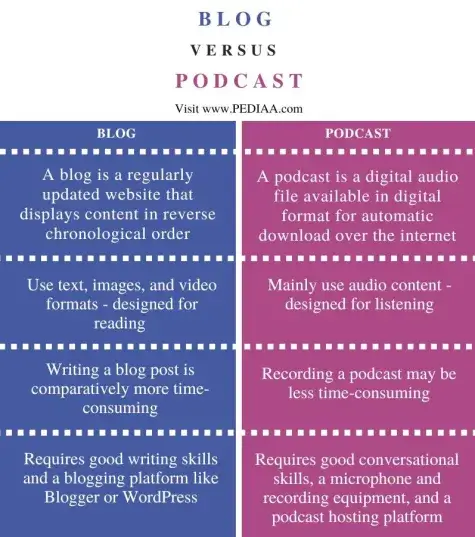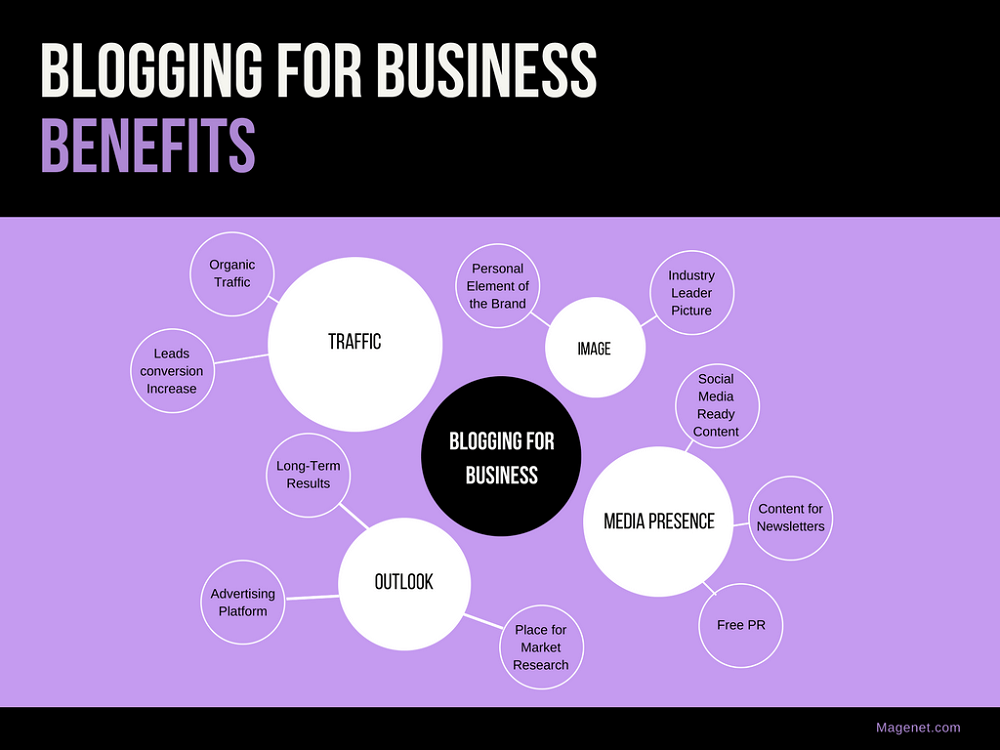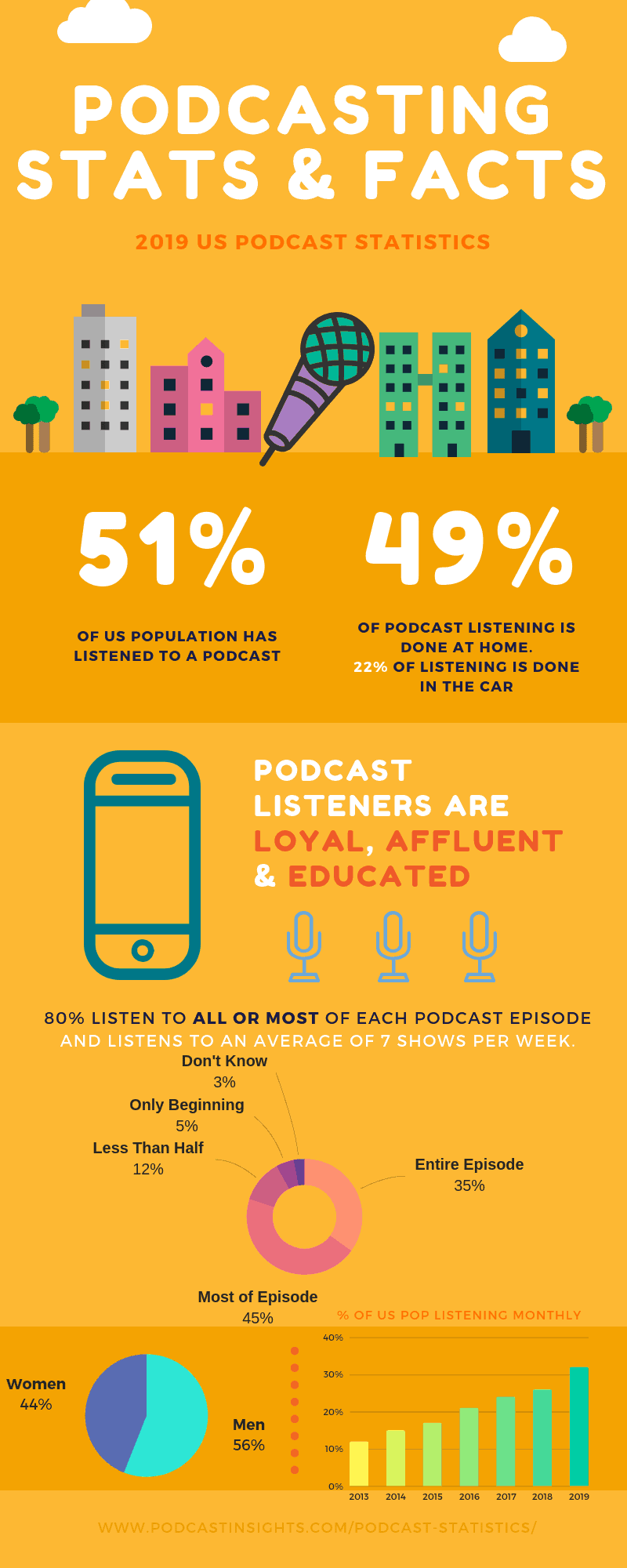Content
SHARE

In today’s fast-paced digital world, brands have many options for marketing and connecting with their target audience. Among the most popular choices are blogs and podcasts.
Both mediums offer unique advantages, but deciding which one to invest in can be challenging. In this article, we will explore the basics of blogs and podcasts, delve into the benefits each can bring to your brand, evaluate the associated costs, and ultimately help you make an informed decision: blogs, podcasts, or both.
 Understanding the Basics: Blogs and Podcasts
Understanding the Basics: Blogs and Podcasts
When it comes to online platforms for sharing content, two popular options are blogs and podcasts. Let’s take a closer look at what each of these mediums entails.
What Is a Blog?
A blog, short for “weblog,” is an online platform where individuals or businesses can publish content in a chronological format. It’s like having your digital journal or magazine.
Blogs typically consist of written articles or posts that cover a wide range of topics, from informative pieces on current events to personal stories and experiences.
One of the great things about blogs is that they often have comment sections, allowing readers to actively participate in discussions.
This interactive element fosters a sense of community and encourages engagement between the writer and the audience. It’s like having a virtual conversation with like-minded individuals who share similar interests or perspectives.
Furthermore, blogs can be a powerful tool for businesses to establish their online presence and connect with their target audience. Regularly publishing valuable and relevant content allows businesses to position themselves as industry experts and build trust with potential customers.
What Is a Podcast?
While blogs primarily focus on written content, podcasts offer a different kind of experience. A podcast is an audio or video recording that can be downloaded or streamed. It’s like having your own radio or TV show that people can listen to or watch at their convenience.
Podcast episodes are usually released regularly, whether it’s weekly, bi-weekly, or monthly. This consistency allows listeners to anticipate new episodes and creates a sense of loyalty and connection with the podcast host or hosts.
Unlike blogs, podcasts offer a more immersive experience. Listeners can tune in to their favourite podcasts while performing other activities, such as commuting, exercising, or doing household chores.
This multitasking ability makes podcasts a popular choice for those who want to make the most of their time and stay entertained or informed while on the go.
Another advantage of podcasts is that they often feature interviews or conversations with experts in various fields.
This allows listeners to gain insights and knowledge directly from industry leaders, expanding their understanding of specific topics or industries.
Moreover, podcasts can be a great platform for storytelling. Whether it’s sharing personal experiences, discussing thought-provoking ideas, or narrating captivating stories, podcasts have the power to captivate and engage listeners in a unique way.
Both blogs and podcasts offer valuable platforms for sharing content and connecting with audiences. While blogs provide a written format that encourages discussion, podcasts offer an immersive audio or video experience that can be enjoyed on the go.
Whether you prefer reading or listening, there’s something out there for everyone to enjoy and explore.
 The Benefits of Blogging for Your Brand
The Benefits of Blogging for Your Brand
Blogging has become an essential tool for businesses looking to enhance their online presence and connect with their target audience.
Not only does it provide a platform for sharing valuable information, but it also offers numerous benefits that can help boost your brand’s success.
Enhancing Your SEO Through Blogs
One of the key advantages of incorporating a blog into your brand’s website is its ability to improve your search engine optimisation (SEO) efforts.
Search engines like Google love fresh and relevant content, and by consistently creating high-quality blog posts, you can increase your website’s visibility in search engine results.
When you publish blog posts optimised with relevant keywords, you give search engines more opportunities to index your website for those specific terms. This, in turn, helps improve your website’s ranking and increases the likelihood of attracting organic traffic.
Furthermore, blogs provide an excellent opportunity to incorporate internal links, which can help improve your website’s overall structure and navigation.
By strategically linking to other relevant pages within your website, you can enhance the user experience and make it easier for both search engines and visitors to find valuable information.
Building a Community With Your Blog
Aside from its SEO benefits, a well-executed blog can also help transform your brand into a vibrant community hub. By engaging with your readers through comments and social media, you can foster a sense of belonging and loyalty among your audience.
Encouraging discussions and actively participating in the comments section of your blog posts allows you to connect with your readers on a deeper level.
By addressing their questions, responding to their feedback, and providing valuable insights, you can build solid relationships and establish yourself as an authority in your industry.
Moreover, a blog can serve as a platform for your audience to interact with each other. Creating a space where readers can share their thoughts, opinions, and experiences encourages a sense of community and creates a supportive environment for like-minded individuals.
Building a community around your brand increases brand awareness and fosters trust and loyalty. When your audience feels connected to your brand and sees that you genuinely care about their opinions, they are more likely to become loyal customers and advocates for your business.
Blogging offers a multitude of benefits for your brand. From enhancing your SEO efforts to building a thriving community, a well-maintained blog can significantly contribute to your brand’s success.
So, start creating valuable content, engage with your readers, and watch your brand flourish in the online world.
 The Advantages of Podcasting for Your Brand
The Advantages of Podcasting for Your Brand
Reaching a Mobile Audience with Podcasts
Podcasts have gained immense popularity due to their convenience and availability on mobile devices. According to recent studies, the number of podcast listeners is steadily rising.
By investing in podcasting, you can tap into an audience that prefers to consume content on the go, increasing your brand’s reach and potential customer base.
In today’s fast-paced world, people are constantly on the move. Whether commuting to work, hitting the gym, or simply taking a stroll, mobile devices have become essential companions.
You can reach this mobile audience and engage them with your brand with a podcast. Imagine the impact of having your brand’s voice in their ears as they go about their daily activities.
Furthermore, podcasts offer a unique opportunity to connect with your audience on a personal level. Unlike other forms of content, podcasts allow you to speak directly to your listeners, creating a sense of intimacy and authenticity.
You can establish a loyal following and turn listeners into brand advocates by providing valuable and entertaining content.
Establishing Authority through Podcasting
Podcasts provide a unique platform for sharing your expertise and establishing yourself as an authority in your industry.
You can build credibility and trust with your listeners through well-researched and insightful discussions. As a result, your brand can gain recognition as a go-to resource, generating new leads and opportunities.
Think about it – when you listen to a podcast hosted by someone knowledgeable and passionate about a particular subject, you naturally start to view them as experts.
The same can happen for your brand. By consistently delivering high-quality content that showcases your expertise, you can position yourself as a thought leader in your industry.
Moreover, podcasts allow you to delve deeper into topics that may not be covered in other forms of content. You can invite industry experts, thought leaders, and even customers to share their insights and experiences. This adds variety to your podcast and enhances your brand’s credibility by offering diverse perspectives.
Additionally, podcasting can open doors to new opportunities. As your reputation grows, you may be invited to speak at conferences, participate in panel discussions, or even collaborate with other influential individuals in your field.
These opportunities can further solidify your brand’s authority and expand your network.
 Evaluating the Costs: Blogs vs. Podcasts
Evaluating the Costs: Blogs vs. Podcasts
The Financial Implications of Blogging
Creating a blog does not require a significant financial investment. Platforms like WordPress and Blogger offer free options to get started, while premium themes and plugins provide additional customisation.
However, keep in mind that crafting high-quality content requires time and effort, which should be factored into your decision-making process.
The financial Implications of Podcasting
Podcasting, on the other hand, can involve higher upfront costs. You may need to invest in recording equipment, editing software, and hosting services to produce professional-quality audio.
Additionally, creating engaging content and consistently releasing episodes require time and dedication. However, the popularity of podcasts and potential monetisation opportunities can offset these expenses in the long run.
Making the Decision: Blogs, Podcasts or Both?
Assessing Your Brand’s Needs and Resources
When considering whether to invest in blogs or podcasts, assessing your brand’s needs and available resources is crucial. Determine your goals, target audience, and the type of content you excel at creating.
Consider your team’s skills and availability, as well as your budget. A thorough evaluation will help you make an informed decision.
Aligning Your Choice with Your Target Audience
Your choice between blogs and podcasts should align with the preferences and habits of your target audience. Research their content consumption patterns, such as whether they prefer reading or listening.
By catering to their preferences, you can maximise engagement and ensure your message resonates with your intended audience.
Considering the Future Trends: Blogs or Podcasts?
Lastly, it’s crucial to consider the future trends of the digital landscape. While both blogs and podcasts are currently popular, staying informed about emerging technologies and changing consumer preferences can give you a competitive edge.
Keep an eye on industry developments and be prepared to adapt your content strategy accordingly.
Whether you invest in blogs, podcasts, or both ultimately depends on your brand’s unique needs and circumstances.
Each medium offers distinct advantages and benefits, and the ideal approach may involve a combination of both blogs and podcasts.
By carefully evaluating your options and considering the factors discussed in this article, you can make an investment that aligns with your brand’s goals and resonates with your target audience.
Frequently Asked Questions About Blogs vs. Podcasts
Is a Blog or Podcast Better?
The choice between a blog and a podcast depends on your goals, audience, and resources. Blogs are better for SEO and attracting traffic through search engines, while podcasts can create a more personal connection with your audience and are great for people on the go. Consider your content, target audience, and personal strengths when making a decision.
Are Blogs or Podcasts More Profitable?
Both blogs and podcasts have the potential to be profitable, but the monetisation strategies are different. Blogs can generate income through advertising, affiliate marketing, sponsored content, and product sales. Podcasts can be monetised through sponsorships, listener donations, advertising, and selling merchandise or services. The profitability depends on the niche, audience size, and engagement.
Should I Start a Blog or Podcast First?
If you are good at writing and SEO and want to drive traffic from search engines, starting a blog might be the better option. If you prefer speaking, have a good voice, and want to connect with your audience more personally, a podcast might be more suitable. Some creators start with a blog to establish their content and audience before branching into podcasting.
Should I Turn My Blog Into a Podcast?
Turning your blog into a podcast can be a great way to repurpose content and reach a wider audience. It allows you to cater to different preferences; some prefer listening over reading. However, it requires additional resources for recording and editing audio, and you need to ensure that your content translates well into spoken word. Before making the decision, consider whether your audience will likely engage with audio content and if you have the necessary resources to produce high-quality podcasts.

 The Benefits of Blogging for Your Brand
The Benefits of Blogging for Your Brand The Advantages of Podcasting for Your Brand
The Advantages of Podcasting for Your Brand Evaluating the Costs: Blogs vs. Podcasts
Evaluating the Costs: Blogs vs. Podcasts










